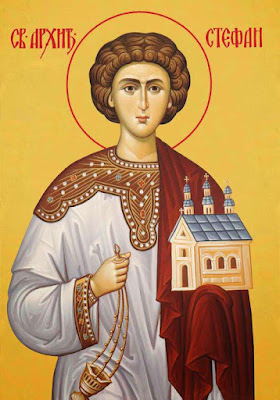Saint Stephen, known as the Protomartyr (first martyr), occupies a revered place in Christian history and Serbian culture. His life, marked by faith, courage, and service, serves as a timeless example of devotion. In Serbia, his feast day, celebrated on January 9, holds special significance, a day of both spiritual reflection and communal festivity.
The Life and Legacy of Saint Stephen
The name Stephen, derived from the Greek word stephanos meaning “crown,” is fitting for this saint who earned the “crown of martyrdom.” Saint Stephen was one of the first seven deacons chosen by the Apostles to assist in the early Christian Church. Tasked with distributing aid to the poor, particularly widows, he exemplified selflessness and compassion.
Beyond his charitable duties, Stephen was a powerful preacher and miracle worker, as documented in the Acts of the Apostles. His bold proclamations of faith, however, attracted opposition from various Jewish leaders. Accused of blasphemy, he was brought before the Sanhedrin, where he delivered a fearless speech condemning their resistance to God’s prophets and the Holy Spirit.
Enraged by his words, the crowd dragged Stephen outside Jerusalem and stoned him to death, making him the first Christian to die for his faith. Remarkably, as he faced death, he prayed for his executioners, saying, “Lord, do not hold this sin against them.” This act of forgiveness echoed Jesus’ words on the cross and underscored Stephen’s unwavering faith.
Saint Stephen’s legacy lives on as the patron saint of deacons, altar servers, and stonemasons. He is often depicted in religious art holding stones, a Gospel book, or a miniature church, symbolizing his martyrdom and faith.
Saint Stephen’s Slava in Serbian Tradition
In Serbian Orthodox Christianity, Stjepanjdan is celebrated on January 9 as part of the Christmas season. This day is also recognized as the first baptismal feast after Christmas, signifying renewal and spiritual rebirth.
Saint Stephen holds a special place in Serbian culture, with more than fifty Orthodox churches dedicated to him across the country. His feast day, often observed as a Slava (patron saint’s day) by Serbian families, is a time for prayer, feasting, and family gatherings. The Slava tradition, unique to Serbs, involves honoring the family’s patron saint with a special ritual, including the breaking of a Slava bread (known as kolač) and the lighting of a candle.
The celebration of Stjepanjdan reflects both religious devotion and the preservation of Serbian identity and tradition. Families come together to honor Saint Stephen’s memory, recount his story, and seek his blessings for the coming year.
Saint Stephen: A Symbol of Faith and Forgiveness
Saint Stephen’s life and martyrdom continue to inspire Christians worldwide. His unwavering faith in the face of persecution, his dedication to service, and his capacity for forgiveness are timeless virtues.
In Serbia, the celebration of Saint Stephen’s feast day as a Slava not only honors his legacy but also strengthens the bonds of faith, family, and community. For Serbs and Orthodox Christians, Saint Stephen remains a symbol of courage, compassion, and the enduring power of faith.
As we remember Saint Stephen on January 9, let us reflect on his life and the values he stood for, drawing inspiration from his example to live lives of service, love, and forgiveness.
Thank you!
